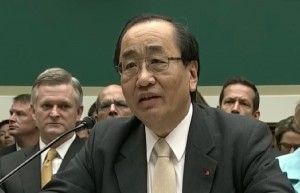
Takata's Hiroshi Shimizu testified before a congressional subcommittee, but the company maintains it doesn't need to expand its recall.
Days after Toyota and Nissan announced the recall of 6.5 million vehicles due to potentially faulty Takata airbags, Honda and Daihatsu have launched new service actions of their own covering yet another 5 million vehicles sold worldwide.
That will bring to about 35 million the total number of vehicles that have been recalled as a result of a problem that can cause airbags to inflate over-aggressively in a crash, sending shrapnel flying into the passenger compartment. The problem has so far been linked to a half-dozen deaths, most of them in the United States.
As part of the latest announcements, Honda will inspect and, if necessary, replace airbags in 4.89 million vehicles sold around the world. Honda, which has a financial relationship with Takata as part of its keiretsu, or closely linked supplier network, has had the largest number of vehicles impacted by the airbag problem.
Little Daihatsu, meanwhile, will recall 260,000 vehicles sold in Japan.
As with earlier recalls for Takata airbags, the vehicles added to the list are generally older models, some dating back more than a decade.
(Toyota, Nissan recall 6.5 million vehicle due to Takata airbags. For more, Click Here.)
As with earlier recalls, meanwhile, the vast number of vehicles covered by the announcements only complicates the problem. Dealers have been struggling to find time to schedule all the inspections and repairs, and manufacturers have found it difficult to get the necessary replacement airbag inflators thought to be the cause of the problem.
Yet, the latest actions may not spell the end of the Takata problem, however, as some safety advocates are calling for the recall of as many as 30 million vehicles equipped with suspect Takata airbags in the U.S. alone.
Prior to the latest Honda and Daihatsu moves, 10 different automakers had already recalled nearly 30 million cars, trucks and crossovers worldwide to inspect and, if necessary, replace the inflators in Takata airbag systems. The latest recall announcements stand out because the vast majority of the vehicles were sold in Japan and other overseas markets. Until now, 17 million of the recalled vehicles were sold in the U.S.
(Click Here for details about Honda’s expansion of its Takata-based recalls.)
Experts remain puzzled about precisely what is causing Takata airbags to inflate over-aggressively. Initial studies have suggested the problem may be most severe among vehicles operated in areas with high humidity, which led to initial geographic-based recalls focusing on states like Florida and Louisiana, as well as the territory of Puerto Rico.
But several incidents, including at least two deaths, have occurred in areas not covered by those actions, leading critics to contend that humidity is, at most, a contributing factor. Clarence Ditlow, director of the Washington-based Center for Auto Safety, said his non-profit group believes the pyrotechnic material used for Takata’s airbag inflators may break down as it ages, leading it to fire too rapidly.
The National Highway Traffic Safety Administration has been pressing Takata to expand its recall, a move the supplier has resisted, insisting there is no evidence to support such a move. But Honda, Toyota and Nissan, among other automakers, have added vehicles to their recall list anyway.
Meanwhile, NHTSA has been fining Takata $14,000 per day since Feb. 20 for reportedly providing documents to the agency without the required explanation of what they contain. The fines have already topped $1 million.
(To see how Takata-based recalls hammered Honda’s earnings, Click Here.)
The feds are also pressing to speed up the repair process and several automakers have turned to alternative vendors for replacement airbag parts.
